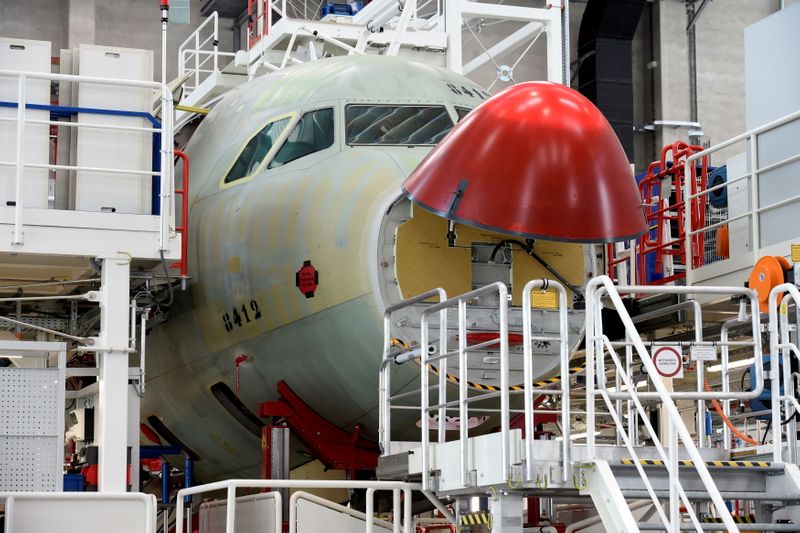By Tim Hepher and Laurence Frost
PARIS (Reuters) -Most airliners will rely on traditional jet engines until at least 2050, Airbus told European Union officials in a briefing released on Thursday on its research into creating zero-emissions hydrogen fuelled planes.
The planemaker says it plans to develop the world's first zero-emission commercial aircraft by 2035, but has not publicly said whether the technology will be ready for the replacement for the medium-haul A320, due to be rolled out in the 2030s.
February's briefing to EU officials appeared to rule this out.
"Zero-emission hydrogen aircraft will be primarily focused on regional and shorter-range aircraft from 2035. Which means that current and future iterations of highly efficient gas turbines will still be required as we move towards 2050, especially for long-haul operations," the presentation said.
It did not give any details on how the technology, which is still on the drawing board, would be introduced into the smaller planes. Airbus says it is still studying various concepts.
Slides from the presentation to the office of European Commission Vice-President Frans Timmermans were released by InfluenceMap, an investor-led climate lobbying watchdog which said it obtained them through a freedom of information request.
They were part of a wider set of documents issued by the watchdog, which said airlines and manufacturers had urged policymakers to use EU-backed green stimulus funds to support aviation.
Airbus declined detailed comment on the February meeting.
Although research remains at an early stage, possible paths to replacement of the A320 are already a major focus of debate as rival Boeing (NYSE:BA) ponders how to shore up the competing 737 MAX and engine makers focus on evolving gas turbines.
Boeing Chief Executive Dave Calhoun last week ruled out using hydrogen on a significant scale before 2050.
Hydrogen has also taken centre-stage in talks over European government support for aviation during the COVID-19 crisis.
In June last year, France announced an increase in funding for the CORAC aviation research body including 1.5 billion euros over three years for technology such as hydrogen, rescuing 500 out of 15,000 jobs threatened by an Airbus restructuring.
In briefing notes, the finance ministry listed targets for investment including hydrogen as a primary energy source for a successor to the A320 that could enter service in 2033-2035.
TOO EARLY TO DECIDE
Industry officials have played down the prospect of a switch to hydrogen for the A320 family's replacement because of the aircraft's size and range, and infrastructure needed globally. Airbus says an A320 takes off or lands every 1.6 seconds.
Airbus officials say the research will, in any event, seed disruptive technology likely to play a role in the next generation of airplanes.
Airbus engineering chief Jean-Brice Dumont told the French AJPAE media association on Thursday that hydrogen was one of several paths towards the decarbonisation of aviation and it was too early to say in what part of the market it would be used.
"We are potentially slicing up the market in a different way but it is far too early to talk about it," he said.
As an interim step, Airbus and others have called for more use of sustainable aviation fuels (SAF) in existing planes. Airbus said on Thursday it would test-fly an A320 with 100% SAF by the end of this year. Current regulations allow a 50% mix.
In February's presentation, Airbus displayed industry forecasts suggesting the A320's medium-haul category of 150-250 seats would be powered by sustainable aviation fuel (SAF) first, and "potentially some hydrogen" from 2050.
A smaller niche between 100-150 seats, which includes its A220 and Embraer E2, would use electric power, hydrogen and/or SAF from 2040, while only regional 50-100 seaters would be ready for hydrogen in the 2030s.
Airbus currently serves that market through its 50-70-seat ATR turboprop co-venture with Italy's Leonardo.

In September last year, Airbus presented three concepts for a hydrogen plane to enter service in 2035 including a turboprop, a traditional-looking twin-engined plane powered by hybrid-hydrogen engines and a more radical blended-wing body aircraft.
Airbus has said it will choose the final product for a new decarbonised plane in 2025. The briefing said it would also narrow down the choice of concept as early as mid-2022.